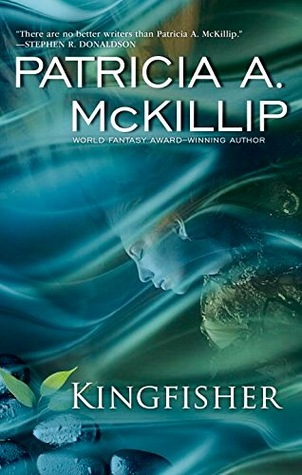I’m pretty sure that somewhere in all fantasy author contracts is the Arthurian Clause: a section stipulating that at least once in their careers, each author must take on some aspect of the King Arthur legends. I’m not sure what the penalty for them is if they don’t, but the penalty for me is that I’ve read so much Arthurian lit that I’m permanently wary of it. A new take on Guinevere you say? Pardon me while I run in the opposite direction.
It’s not like I hate Arthur and co. I love the source material, and The Mists of Avalon is one of my favorite books ever. And it’s always intriguing to see an established author take on the myths rather than an amateur. Patricia A. McKillip is certainly established. She’s been fantasy mainstay for years–decades–and she does well with this lesser-known tale from the Arthurian corpus, for the most part.

I miss Kinuko Craft’s art.
The story of the Fisher King–the keeper of the Grail who cannot repair his own unhealing wound, but who must wait for a pure knight to come and ask the right questions–is part of the grail quest, which nobody seems to like as much these days. That’s probably because the French Vulgate cycle obsessed so awfully much about virginity, and the entire quest is a huge disaster that happens right before Arthur’s defeat. It’s basically a giant bummer. (Also Indiana Jones’s take is really hard to live up to. Who can top Sean Connery destroying a Nazi airplane with birds?)
McKillip’s version begins with Pierce, son of a witch-turned-restauranteur (a deeply weird combination that only McKillip could pull off without making a farce of the characters) who wants desperately to know his father and his heritage. He finally find the impetus to leave his backwater home and travel to the capital, Severluna, after meeting a trio of knights who promise him a place. But he also finds a place at the Kingfisher, a run-down restaurant with more secrets than you could shake a stick at. There he meets Carrie, a woman also searching for answers. She knows who her father is–the half-mad Merle–but she doesn’t really know her father, and he won’t–or can’t–tell her what on earth is going on with the Kingfisher. The weekly ritual, the estranged owners, the possible feuds…it’s all entwined with Carrie and Pierce–and with Daimon, the bastard youngest son of Severluna’s king. Daimon knows his father, all right, but he’s ignorant of his mother’s history and heritage. Even her name is occluded.
These three seekers become entangled with a quest for a holy cup, and with Severluna’s politics, and yes, with restaurant rivalries (another sentence that only McKillip could make reasonable). Hunger is a persistent theme, the bone-deep longing of children to make sense of their worlds once they know there are secrets. Food, too, is ever-present as a metaphor and a means to explain magic and holiness and curses. In a way it makes sense, since the grail is in a most basic sense a cup that was used in a feast.
McKillip’s magic is always the polar opposite of someone like Sanderson with his rigorous systems. Instead, it’s half aesthetics and half emotion: all the characters manage feats when in the throes of some deep, electric feeling, and all the outcomes are startlingly pretty. As ever, McKillip’s entire books are beautiful. Everything lovely and desirable is a metaphor for everything else: eyes are like caramel, amber is buttery-gold, desserts are jewels with garnishes like fine clothes. It’s all so sumptuous and seductive. If you know McKillip you know to expect this, but even so it strikes you anew how decadently Rococo her prose can be.
But to choose an Arthurian legend is to invoke certain characters, and acknowledge their roles by either retelling their stories or deviating from them. Obviously Merle is Merlin, but others are not so simple to decipher. Pellinor is Hal? Who exactly is Elaine? And Morgan, and Mordred? What is the power in this world? Yes, part of the fun might be the mystery, but it becomes frustrating when everyone seems like they might be a character you know, if only the camera would focus. Knowing the legends in this case is as much a distraction as it is a help.
I also found the choice of a semi-modern setting a little odd, especially since McKillip has tended to stay firmly within medieval worlds with swords and horses, not credit cars and cards–and certainly not restaurants.
There’s something a little odd about choosing a formerly glorious hotel kitchen as the backdrop for this story. It has no obvious analogue to the court of the Fisher King, and we spend so much time mired in Pierce and Carrie’s confusion and ignorance that everything seems a bit too obscure. What does King Arden’s (Arthur’s) court have to do with a decaying restaurant, exactly?
Well, a lot, but not right off the bat. The time it takes to tie it all together left me puzzled for much longer than I would have liked, but it does all come together rather splendidly. It was never really a matter of disaster, though. McKillip is accomplished and deft; it’s impossible to imagine how she could write a bad book. It was always a question of good or great, and while this left me quite happy in the end, it is not my favorite of her works. (The Riddle-Master Trilogy, Ombria in Shadow, and Alphabet of Thorn, if you were wondering.) Still, it’s a worthy and gorgeous read.
